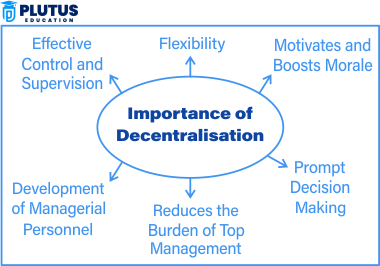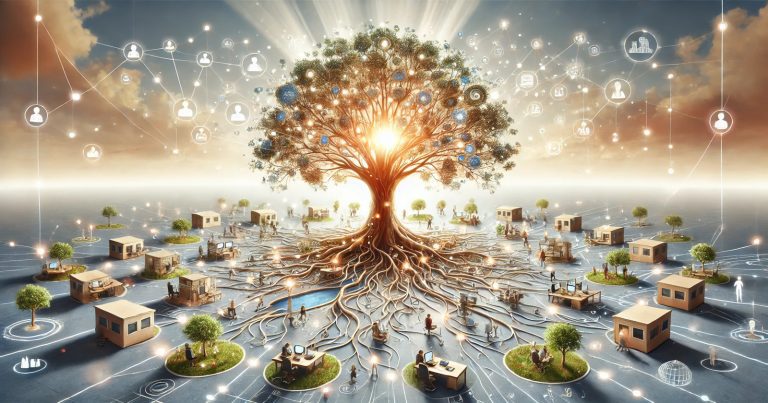Decentralization is the term used to refer to the decentralising of power and authority or responsibility from a central body like a government or corporation down to lower local or regional levels. In this process, individuals, groups, or sub-units in an organisation or system are given the right to make decisions, manage resources, and formulate policies about their local needs. The benefits of decentralization are innumerable, and its importance is evident in every sector, whether it is business, government, or education.
Meaning of Decentralization
Decentralisation means handing over the decision-making powers and authorities to lower or middle management groups within an organization. It reduces the involvement of top-level management in more minor decisions. Thus, a significant improvement in operational efficiency was realised. The department heads and regional managers who are low in the hierarchy are given decision-making freedom. To choose their market area, the actions are consistent with local conditions and needs.
This concept is essential in public and private organizations in India. For instance, the Indian government has supported decentralisation to allow power decentralisation and streamline administration. In India, the industries are continually growing in complexity. Decentralisation now forms an integral part of these businesses. Large business ventures usually favor decentralisation as a better tool for efficient management. Its geography is too extensive to handle efficiently from a single nerve centre.

Importance of Decentralization
Decentralisation is an exercise in redistributing or delegating authority and responsibility from a central body, oftentimes through governments or corporations at the local and regional levels. In this regard, the right is to authorise people, groups, or units of an organisation or system at different levels or hierarchies to decide the matters, be it the administrative resources, planning, or designing policies considered necessary at each local level of need.
Improves Responsiveness
Decentralisation pushes decision-making to the grassroots; therefore, local leaders or managers are aware of the needs and preferences of the people they serve. The proximity allows quick responses to challenges that may be emerging, like natural disasters, economic crises, or local social issues. It eliminates the approval process from the higher authorities; therefore, decisions can be made and implemented faster, thus enhancing overall Responsiveness in any sector.
Fosters Innovation
Granting subunits or units of the business the freedom allows them to try new strategies, ideas, and technology. The opportunity to innovate gives organizations the leverage to remain competitive and responsive to the dynamic changes in the marketplace. For instance, in the business world, decentralisation would allow regional offices to change the product or service to suit local tastes, opening up new doors for business. Innovation is essential in government and education, and local policymakers can adapt policies or curricula to the peculiar needs of the population.
Efficiency
Decentralised decision-making processes may respond quicker, which positions them better to make and enforce decisions. A centralised system often delays because decisions have to sift through the layers of bureaucracy. Decentralization, therefore, empowers lower levels of management or even authorities on the local level, placing the system in a better position to respond promptly to challenges or opportunities arising within an organisation. This lies at the heart of most industries that make time-based decisions that affect customer satisfaction and organizations.
Empowerment of Local Leaders
Decentralization allows local leaders more power in decision-making and directs resources in ways that benefit the community or departments. This can lead to performance because regional leaders are closer to their immediate environment’s needs and priorities. This freedom further enhances leadership development because people become empowered with a sense of responsibility for critical decision-making. In turn, this contributes to the growth of leadership skills in an organization or system of governance.
Encourages Accountability
Decentralization increases accountability through transparency. Local decisions make leaders answerable to people. In business, managers meet set targets. Employees are responsible for their performance. In government, local authorities serve their communities. This ensures better and fair service delivery.
Promote Balanced Regional Development
Decentralization helps achieve a balanced regional development. Local authorities create strategies based on local needs. They understand their areas better than others. This ensures fair resource distribution across regions.
Neglected areas can focus on their needs. They get a chance to develop independently. Decentralization reduces regional imbalances effectively. It drives both economic and social growth.
Facilitates Increased Public Participation
Decentralization helps people join decision-making. It lets governments involve citizens in policies. Local authorities allow public contributions to policies. This improves immediate living conditions for citizens. It also promotes greater democratic participation.
In business, it empowers employees and managers. In education, it gives students a voice. They can share ideas and solve problems. More participation creates a sense of ownership. This leads to higher satisfaction and better results.
Decentralization improves public and private governance by making decision-making more efficient and effective. Decentralized units that are given the authority to make decisions are more likely to be responsive to the needs of the people they serve. Government direction requires this direction to be more responsive and transparent. At
Augments Economic Development
Decentralization fuels economic growth. Local businesses create strategies based on market conditions. Decentralized systems help offices meet local needs. This often leads to successful operations. Companies adjust their strategies to gain an edge. Governments develop projects based on regional potential. Organizations use flexibility to ensure sustainable growth.
Relieves Central Authorities from Burden
The decentralization process minimizes the work of decentralization bodies in handling the situation compared to the centralized situation. Central bodies cannot keep up with the decentralization and, therefore, have ample time to develop general policies and plan and monitor the system’s general running. This makes it easy for local leaders or managers to run day-to-day affairs efficiently. In this regard, the system will accomplish its goals and objectives efficiently.
Role of Decentralization in India
The Indian government has started taking measures of power decentralisation within a few areas . This is to support governance and economic growth. The powers of decentralised decisions directly influence regional areas . This have made state governments differ as they design their policies to meet local needs. In such ways, there have been developments in education, healthcare, and infrastructure regarding delivery services.
Decentralisation also suits the Indian private sector since the regional branch or its manager can make decisions individually. Retail, manufacturing sector – knowledge about a local market or quick response and decision at an appropriate time, indeed, can create a great deal of difference between winning or losing in a contest. Decentralisation for these companies helped even Tata, Infosys, and Reliance run large-scale activities across diverse regional locations.
Why Decentralization Matters in Government?
The importance of decentralization in government is that it improves governance at the local level. Decentralizing power ensures that decisions are made closer to the people, which can result in more relevant and effective policies. It also allows for more excellent Responsiveness to local needs and issues. A central government of decentralization and flexibility Decentralization regional disparities effectively, and decentralization helps overcome this challenge by devolving power to the local authority. Decentralization is a significant decentralization of democratic processes in India’s local self-governance. The constitutional amendments that established organizations and urban local bodies made governance close to the community to address the issues of organizations’ decentralization organizations, empowering local leaders and citizens and thus exercising power over their development.
Importance of Decentralisation FAQs
- What is decentralisation in management?
Decentralization in management refers to the distribution of decision-making authority to lower levels of an organization.
- What are the most essential benefits of decentralization?
It provides quicker decision-making, higher adaptability, and quality responses to customers.
- What are the disadvantages of decentralization?
It leads to inconsistent decisions, coordination problems, and loss of control.
- When does decentralisation perform best?
Decentralisation performs best when there are complex organizations involving a broader type of diversification. Also, where responses are needed faster, innovation is required.
- How does decentralization impact innovation?
Decentralization fosters innovation as it allows the managers to make creative, independent decisions.


